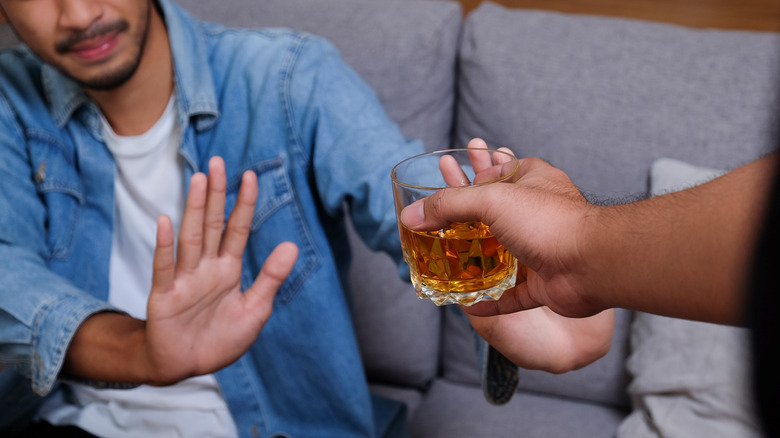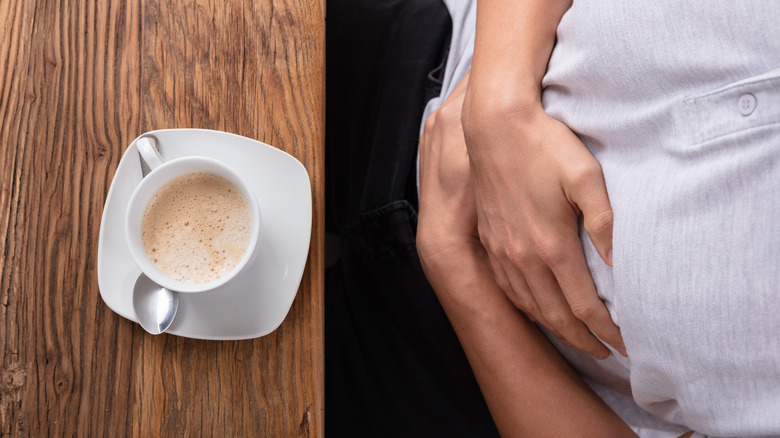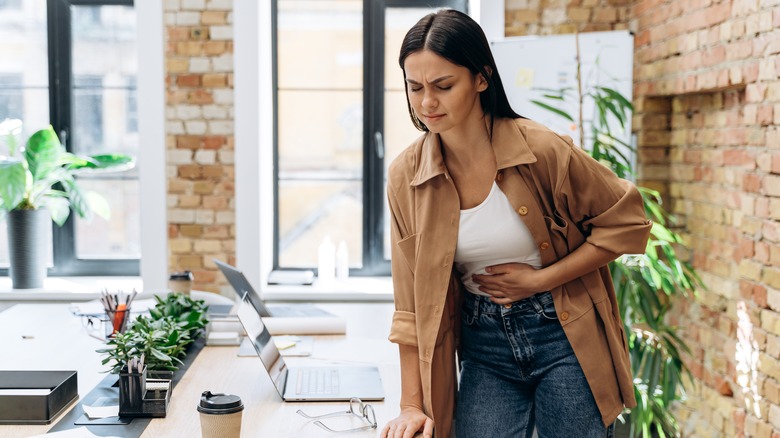What Causes Pain In Your Stomach After Drinking Alcohol Or Caffeine?
More than 60% of Americans start their day with a cup of java, says the National Coffee Association. This beloved beverage energizes the mind and body, sharpens the senses, and boosts mental focus, according to Doist. In addition, a 2015 review published in the journal Current Neuropharmacology suggests that over time, it may improve cognition and protect against neurodegenerative ailments, such as Alzheimer's and Parkinson's disease.
Some of us also reach for a glass of wine after work or on weekends. Alcohol isn't the healthiest choice, but it has its perks when consumed in small doses. As the Mayo Clinic explains, moderate drinking may protect against heart disease, stroke, and diabetes. Heavy drinking, on the other hand, could lead to cancer, liver disease, high blood pressure, and cardiovascular problems. What's more, some beverages — especially cocktails — are often loaded with sugar and empty calories, says Eat This, Not That!.
Leaving these aspects aside, both alcohol and caffeine may cause stomach pain, cramping, and other digestive symptoms. While not everyone will experience these side effects, it's important to figure out the cause.
Caffeine and alcohol can irritate the gut
Alcohol and caffeine are both highly acidic. This can irritate the gut, causing pain, cramping, and stomach upset.
Coffee, for example, increases gastric acid production, which may cause digestive issues in some people, according to clinical research published in the Proceedings of the National Academy of Sciences. This beverage also has mild laxative effects and could give you diarrhea. In some cases, it may trigger or worsen heartburn due to its acidity, explains the organization HealthyWomen.
As far as alcohol goes, most beverages stimulate gastric acid secretion, causing pain and inflammation of the stomach lining, notes Drinkaware. Regular drinking has both immediate and long-term effects on digestive health, including acid reflux, gastritis, and peptic ulcers. For example, alcoholic gastritis can cause pain in the upper abdominal area and other symptoms, such as bloating, nausea, and gastrointestinal bleeding, according to American Addiction Centers.
Last but not least, coffee consumption may lead to irritable bowel syndrome (IBS), suggests a 2015 review featured in Frontiers in Nutrition. It can also worsen its symptoms.
You might have a food intolerance
Stomach pain after drinking coffee could be due to caffeine intolerance. If you're intolerant to caffeine, your body may not be able to break down this compound properly. Verywell Health explains that this can cause digestive distress, among other symptoms. "People's response to caffeine is very individualized," dietician Catherine Rabess told Stylist Magazine. "That's usually based on genetic factors, so it's actually in our DNA and how our body functions," she added.
Likewise, according to WebMD, it's possible to develop an intolerance to alcohol. Its symptoms may include stomach pain, diarrhea, nausea, vomiting, heartburn, rashes, headaches, and rapid heartbeat. This genetic condition affects your body's ability to metabolize alcohol and cannot be treated or prevented, notes the Cleveland Clinic. On the positive side, you can keep it under control by limiting or avoiding alcohol. Alcohol intolerance may increase the risk of liver disease, mouth or throat cancer, and other disorders in people who drink regularly.
What you put in your coffee matters, too. Milk and cream, for instance, contain a natural sugar called lactose. This compound can cause stomach pain, bloating, diarrhea, and other digestive problems in those with lactose intolerance, warns the U.S. National Library of Medicine. These symptoms typically kick in within 30 minutes to two hours after ingesting lactose.



